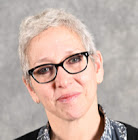Beginning in January, the Library is partnering with the District 65 Family Center to implement LENA Start, a program that uses research-backed methods to encourage and support early talk in children. Talk is the foundation of early literacy, and evidence shows that it is essential in childhood brain development.
Over the course of 11 weeks, LENA Start is designed to provide parents and guardians with objective feedback on their child’s early talk with the help of a “talk pedometer.” Participants will also attend virtual meetings to pick up strategies for engaging with their children and learn how to initiate stronger back-and-forth conversation.

Interested parents can attend virtual orientations on January 6, 9, 14, or 19 to learn more about the program. In the meantime, we asked youth engagement librarian Laura Antolin, an organizer of the program, to give a little more perspective on LENA Start and how it can benefit your kids.
Q: Why is early talk important for child development?
LA: More and more brain research is pointing to talking, of all of the things that you can do with your kids, as one of the most important. Particularly the conversational turns—the back and forth—which develops vocabulary for kids, and understanding. Parents/caregivers may not realize that this starts as soon as your baby is born.
Q: How does LENA Start work?
LA: A parent/caregiver who wants to participate in LENA Start gets a small device, and it fits into a vest or a T-shirt that the parent borrows from us. Once a week, that device is turned on, and it records the back and forth, the talking that happens—it does not understand words, so it’s not recording what’s being said.
That information then gets uploaded (either uploaded by the parent if they have that technology, or we trade it out and we upload it). A report is generated that lets a parent/caregiver know how much talking actually has occurred that one day a week. Parents/caregivers also get a workbook and talking tips and receive a board book each week of the 10 sessions. Parents/caregivers also participate in 10 virtual meetings which are opportunities to talk about what you’re doing and how you’re doing it.
Q: Why do you think this program is important for families impacted by the pandemic?
LA: The thing that we’re hoping for is that these virtual sessions also provide some community for parents. That might be a comfort, and less isolating, to people—to have someone to talk to and talk with about the same kinds of things that you’re going through with your child, or the things that you’re concerned about, or the things that you’re not sure how to do.
Q: How does this program support the Evanston community?
LA: I don’t want to say this is going to close the achievement gap — I think we hope that it helps to narrow that gap. We know that it’s not a level playing field when kids enter kindergarten and that many children don’t have the requisite skills they need. LENA Start is another strategy to help build skills.
I believe that everybody wants the best for their kids. So I think strategies for building early literacy foundational skills are good for everybody and I think all families in our community will benefit from participating.
Q: What would you say to a parent who is undecided about taking part in the program?
LA: It’s research based, and there’s a lot of evidence that the power of talk helps build children’s brains. And the power of feedback helps change adult behavior.
Q: How will parents be able to get involved in January?
LA: We’ll have four orientation dates in January from which to choose. After someone attends an orientation, we will get back in touch with them and see if they are interested in participating, with the goal of having the first actual 10-week session start in February.
Q: Is there anything else you want parents to know about LENA Start?
LA: It’s another tool in a parent’s toolbox. LENA Start provides the reasons that early talk is important and encourages the habit. Why not find as many tools as you can, that are easy to do and can be done anytime?
To learn more about LENA Start or to attend an orientation session, please contact Laura Antolin at lantolin@cityofevanston.org.
